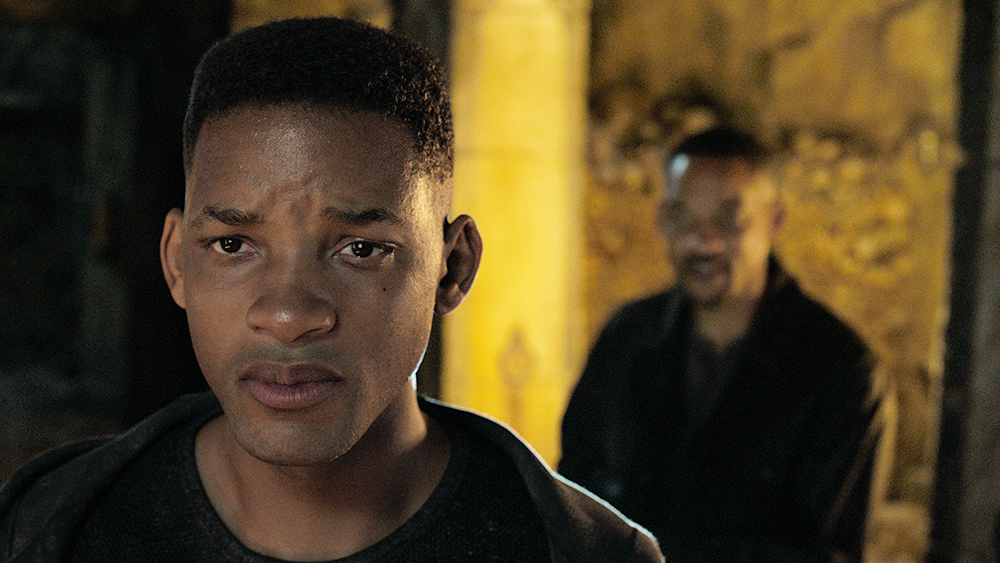While many critics wish to celebrate the artistic side of film, it is, and always has been, a business. For businesses to survive and thrive, they need to innovate. They need to find new ways of getting people to fork over their hard earned money for a unique experience. Sure, it’s all delivered under the guise of ‘entertainment’, but there is still the business-arm of this endeavour we call cinema which relies on money coming in to prosper and flourish. A great filmmaker will make that notion imperceptible, and like a magic trick, you’ve been ‘entertained’.
Film is an inherently reactionary medium. This is why legends like William Castle are still talked about today – he transformed cinema into something else. He embraced changing ideas about films, and made them into carnival-esque shows, where seats vibrated, and skeletons haunted the audience mid-film. Sure, Castle wanted to entertain, but he also needed to make money as well, so each new release needed a new gimmick to bring in audiences. Cinema has changed throughout the years, needing to adjust to ‘new threats’ – the appearance of televisions, the birth-death-birth of video games, the internet – and as such, filmmakers have had to react to oncoming threats to their livelihood.
In our current era, that threat comes in the form of streaming content and 4K home televisions. What need is there for anyone to go to the cinema when they can get a comparable experience at home? Filmmakers like James Cameron and Peter Jackson had tried to innovate and elevate cinema via immersive 3D and high frame rate presentations, and yet, for all the accolades that Avatar received, it shares the same level of forgetfulness that came with Jackson’s Hobbit films. Meaning, you knew that you watched it, as the money came out of your account and you had a ticket, but gosh, you’d struggle to remember anything of value from the film. The main takeaway was that these were visual treats first, second, third, and fourth, and entertaining and engaging narratives fifth.
Two time Oscar winning director, Ang Lee, has been vocal about wanting to push the technological aspects of cinema forward as much as he can. With Life of Pi, he created a film that utilised the format of 3D perfectly, putting you on that same boat as Pi and his feline friend Richard Parker. Then, with Billy Lynn’s Long Halftime Walk, Lee dabbled in the similar high frame rate filming that Peter Jackson did with The Hobbit: An Unexpected Journey. Shot at an eye watering 120 frames per second, Billy Lynn’s Long Halftime Walk failed to engage on an emotional level, instead feeling like a soap opera presentation of war, and in turn, it felt trite and cheap.
Ang Lee’s Gemini Man is as reactionary as film gets. It stares at the oncoming flood of streaming services and quivers. It feels as if this is Lee’s attempt to stave off the debt collectors coming to whisk away every cinema in the land. Presented in 3D and with 120 frames per second, Gemini Man is intended to be as immersive an experience as you’ve ever had in a cinema. Will Smith stars as Henry Brogan, a 51 year old government assassin who, for plot reasons, finds himself going up against a clone version of himself. With the help of Mary Elizabeth Winstead’s operative Danny, and Benedict Wong’s plane flying dude Baron, Brogan will get to the bottom of this dilemma and find out why all of this is happening.
Gemini Man is a film from the nineties that you forgot existed, and twenty years later you rewatch it, thinking, yeah, I remember that being not bad at all, and then, once it’s over, you realise it was worse than you remembered. Written in 1997, and stuck in development hell for two decades, Gemini Man has no reason to exist other than feeling like a reactionary response to Face Off. ‘Oh, you had two great actors go up against themselves in an action film? Well, why not have one actor go up against his younger self in an action film?’ Yeah, you can tell why they weren’t rushing to make this back then, and it most certainly wasn’t because of the lack of technology to de-age the lead. After all, have we forgotten how Dick Smith’s makeup in The Exorcist effectively turned the then 44 year old Max von Sydow into a 74 year old?
If anything, Gemini Man is a technically brilliant film. The de-ageing effects of Will Smith look impressive, with only a moment or two of uncanny valley slipping into the mix. The 120 frames per second immersion works, looking stunning in impressive 3D, so much so that you can’t help but wish that they’d present the next David Attenborough film in this format instead of some tedious narrative fare. There feels like an over-correcting for the usual darkness of 3D, with the majority of the narrative taking place in bright daylight. The climactic night time battle shows how ill-advised the extreme daylight choice was, as it’s here that some of the most impressive visual moments occur. One shot of a soldier rising up in a blanket of fire in a dark warehouse looks jaw-droppingly stunning, making me wish that there were more of these visually creative shots throughout the film.
I have to add, if there is a reason to see Gemini Man, it’s that the film looks stunning, and for someone who usually struggles with 3D films, this one overcame my sight issues. I don’t regret watching Gemini Man, even though it is consistently bland, it is always visually entertaining and engaging.
But, there’s a ‘late to the party’ vibe to Gemini Man, where it feels that it’s coming to the table with a platter of brand new dishes that everyone had already tried. It’s the sliders of films, where everyone went nuts for the mini-burgers a decade ago, Gemini Man comes to table thinking they’re brand new, and treating it as such. It doesn’t help that Ang Lee appears to have forgone the human touch that made his previous films so impactful. I can’t shrug the feeling that Lee now feels that for a film to hit home, it needs to visually astound rather than emotionally hit home for it to work. This is not to say that Will Smith doesn’t have moments of humanity, with one scene where the younger Smith comes to terms with his existence being particularly notable. Even in his worst work (Collateral Damage), he still manages to eek out a moment of brilliance.
For a film that exists to get people out to the theatre, Gemini Man is exceptionally bland and unexciting. Ang Lee is a masterful director, arguably one of the finest working today, but it’s clear that he simply cannot create exciting, engaging action. I can’t help but dream of what a filmmaker like Christopher McQuarrie would do with this 120 frames per second format, but McQuarrie values plot driven action over action driven plot, and I’m not sure that would blend with this show-pony trickery.
The saddest thing about Gemini Man is that unlike The Tingler with its buzzing seats, or Polyester with its sniff-scratch cards, or Avatar with its awe inspiring 3D, there is nothing that will carry on in history about this film. It exists to be forgotten. And that in itself is a depressing notion – if this is meant to be a proof of the evolution of cinema, then I’ll go get a shovel and start filling in the hole. It’s done.
Director: Ang Lee
Cast: Will Smith, Mary Elizabeth Winstead, Benedict Wong
Writers: David Benioff, Billy Ray, Darren Lemke, (based on a story by David Benioff, Darren Lemke)




